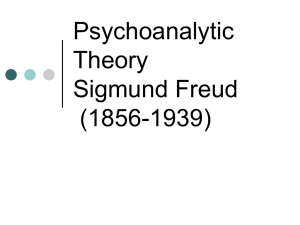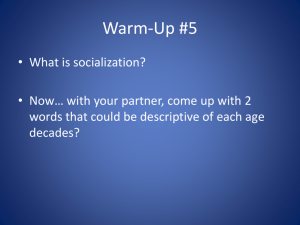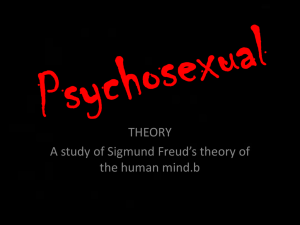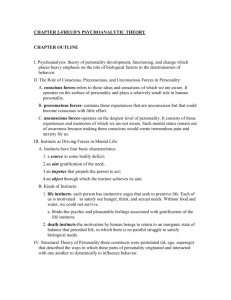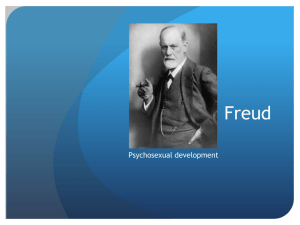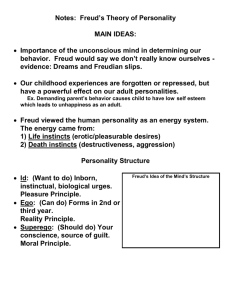Psychiatric Nursing Theoretical Foundations
advertisement
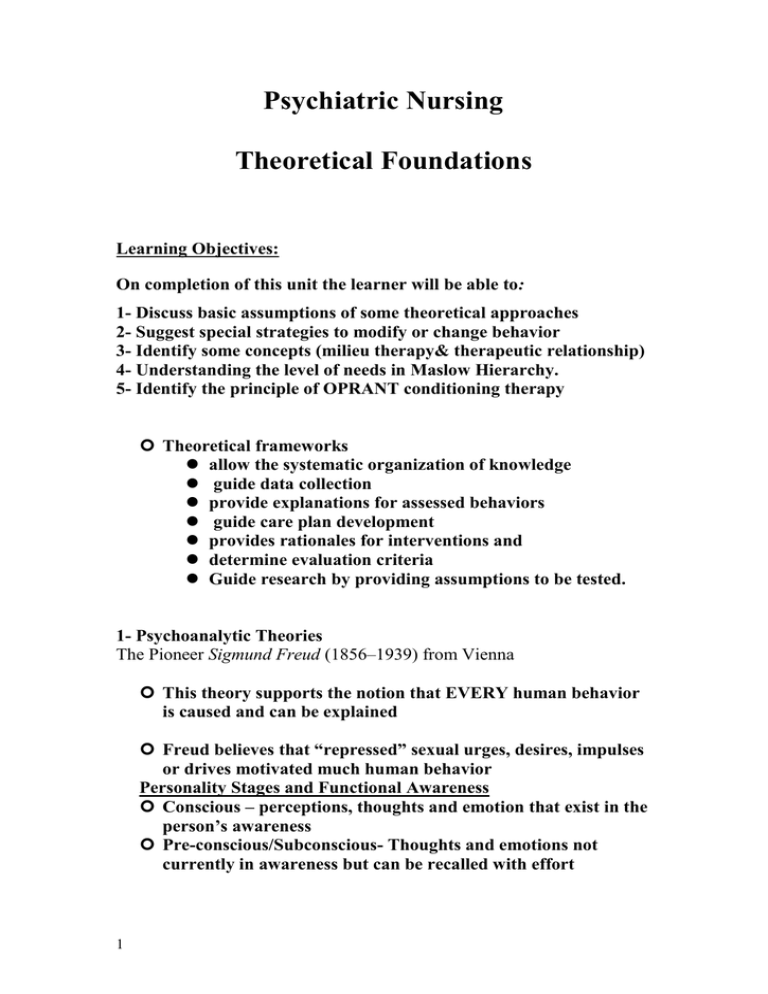
Psychiatric Nursing Theoretical Foundations Learning Objectives: On completion of this unit the learner will be able to: 1- Discuss basic assumptions of some theoretical approaches 2- Suggest special strategies to modify or change behavior 3- Identify some concepts (milieu therapy& therapeutic relationship) 4- Understanding the level of needs in Maslow Hierarchy. 5- Identify the principle of OPRANT conditioning therapy Theoretical frameworks allow the systematic organization of knowledge guide data collection provide explanations for assessed behaviors guide care plan development provides rationales for interventions and determine evaluation criteria Guide research by providing assumptions to be tested. 1- Psychoanalytic Theories The Pioneer Sigmund Freud (1856–1939) from Vienna This theory supports the notion that EVERY human behavior is caused and can be explained Freud believes that “repressed” sexual urges, desires, impulses or drives motivated much human behavior Personality Stages and Functional Awareness Conscious – perceptions, thoughts and emotion that exist in the person’s awareness Pre-conscious/Subconscious- Thoughts and emotions not currently in awareness but can be recalled with effort 1 Unconscious- thoughts, drives and emotions totally a person is Unaware According to this theory, much of our behavior is motivated by our SUBCONSCIOUS thoughts or feelings Five Stages of psychosexual development 1. Oral 2. Anal 3. Phallic or Oedipal 4. Latency 5. Genital Psychosexual/Psychoanalytical Freud's Sit of gratification Focus Age Site of gratification :Mouth 18-0 Oral months 3 - ½ 1 Anal years Site of gratification :Anus Site of gratification :Genitals Phase 5 -3 years 12 -6 years & 12 above Phallic Focus Age Phase Major task :Weaning 18-0 Oral months Site of gratification( :School Activities) Site of gratification :Genitals Latency Genital Developmental tasks 2 Major task :Toilet training 3-½1 years Anal Major task :Oedipal & Electra complex 5 -3 years 12 -6 years & 12 above Phallic Major task : School activities Major task :Sexual intimacy Latency Genital Psychosexual model (Freud) 1. Oral a. 0-18 months b. Pleasure and gratification through mouth c. Behaviors: dependency, eating, crying, biting d. Distinguishes between self and mother e. Develops body image, aggressive drives Dissatisfaction: resurface later by overeating, smoking, nail-biting 2. Anal a. 18 months - 3 years b. Pleasure through elimination or retention of feces c. Behaviors: control of holding on or letting go d. Develops concept of power, punishment, ambivalence, concern with cleanliness or being dirty Possible problems 3 Compulsive need to be clean and orderly. Frugality and stinginess Greed Insistence on doing things at one's own rate at the expense of others Rigid training Excessive messiness and disorderly habits. Nursing Implication: Help children achieve bowel and bladder control without undue emphasis on its importance. 3. Phallic/Oedipal a. 3 - 6 years b. Pleasure through genitals c. Behaviors: touching of genitals, erotic attachment to parent of opposite sex d. Develops fear of punishment by parent of same sex, guilt, sexual identity Possible problems Oedipus complex Electra complex Nursing implications: Accept child's sexual interest Help the parents answer child's questions about birth or sexual differences. 4. Latency a. 6 - 12 years b. Energy used to gain new skills in social relationships and knowledge c. Behaviors: sense of industry and mastery d. Learns control over aggressive, destructive impulses e Acquires friends 5. Genital a. 12 - 20 years b. Sexual pleasure through genitals c. Behaviors: becomes independent of parents, responsible for self d. Develops sexual identity, ability to love and work Psychoanalysis Freud developed psychoanalysis, a therapeutic process of accessing the unconscious and resolving the conflicts that originated in childhood with a mature adult mind. 4 As a system of psychotherapy, psychoanalysis attempted to reconstruct the personality by examining free associations (spontaneous, uncensored verbalizations of whatever comes to mind) and the interpretation of dreams. Therapeutic relationships had their beginnings within the psychoanalytic framework. Unconscious Ego defense mechanism These are PSYCHOLOGIC adaptive mechanisms Mental mechanisms that develop as the personality attempts to DEFEND itself, establishes compromises among conflicting impulses and allays inner tensions The unconscious mind working to protect the person from anxiety Releases tension Ego Defense Mechanisms Compensation: Covering up weaknesses by emphasizing a more desirable trait Denial: Attempt to ignore unacceptable realities by refusing to acknowledge them Displacement: Discharging emotional reactions from one object to a LESS threatening object/person Identification: Imitation of someone feared or respected Intellectualization: Use of rational explanations that remove from the event any personal significance and feelings Introjections: Acceptance of other’s norms as oneself 5 Regression: Resorting to an earlier, more comfortable level of functioning that is less demanding Repression: Unconscious mechanism of keeping threatening desires or thoughts from becoming CONSCIOUS Sublimation: Re-channeling of aggressive energies into socially acceptable activities Substitution: Replacement of a highly valued object by a LESS valuable or acceptable and available object. Undoing: Actions or words designed to cancel some disapproved thoughts, impulses , or acts in which the person relieves GUILT by making reparation PROJECTION: Blaming someone else for one’s difficulties or placing one’s unethical desires on someone else. Involves in the development of DELUSIONS; A nursing graduate blamed a dean of a nursing school in Recto for not passing the nursing exam. CONVERSION: The unconscious expression of intrapsychic conflict symbolically through physical symptoms. A nursing student suddenly went blind after her recent nursing board exam. Psychosexual/Psychoanalytical: Transference and Counter-transference TRANSFERENCE is the clients feeling toward nurse arising from unconscious experiences with early significant others 6 COUNTER TRANSFERENCE is the nurse’s feelings toward the patient arising also form previous experiences The Freudian View of Mental Illness All behavior has meaning Mental illness and manifestations are caused by unconscious INTERNAL conflict arising from unresolved issues in early childhood Ego defenses are utilized to relieve inner tension 7
